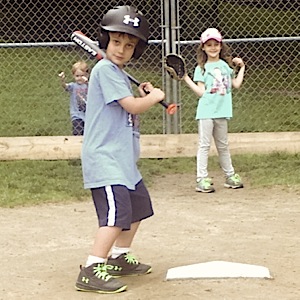
 DULTS AND children sometimes learn very differently. The brains of children are still developing, and adults often assume many things are too difficult for them to learn, absorb, or even attempt. How wrong we are!
DULTS AND children sometimes learn very differently. The brains of children are still developing, and adults often assume many things are too difficult for them to learn, absorb, or even attempt. How wrong we are!
My son has been playing baseball. He bats and throws right-handed. My daughter is left-handed. So one day, while I was throwing batting practice to them, my son wanted to try batting left-handed just like his older sister. It never occurred to him that this would be hard, or that he wouldn’t do well. He just thought it would be fun.
What happened surprised me. Instead of struggling, he hit he ball quite consistently (if not for as much power…) He continued to bat left-handed for the rest of our practice. He had no inhibition to try something potentially uncomfortable, and he had a positive, fun, experience. He’ll probably try it again. I guess I forgot to tell him how hard it is to become a successful switch-hitter.
Furthermore, those who teach languages or music to young school children know better. Certain young ages are ideal times to teach children because they absorb certain things much faster and quite naturally. Start teaching children a new language when they are in high school, and it will be difficult. Start when they are younger, and they will have a far greater chance of mastering the language as they grow.
I live in a town in which the public elementary schools have a French Immersion program. It has become so popular and effective, that they have had to hire more teachers and potentially cap the program.
 ERHAPS MY FAVORITE words of wisdom come from my friend, colleague, and sage, Maestro Michael Olbash. A few years ago, he began a children’s choir who sang a great deal of Gregorian Chant. They sang beautifully; his choir blossomed in size. He said, “They don’t know it’s supposed to be hard.”
ERHAPS MY FAVORITE words of wisdom come from my friend, colleague, and sage, Maestro Michael Olbash. A few years ago, he began a children’s choir who sang a great deal of Gregorian Chant. They sang beautifully; his choir blossomed in size. He said, “They don’t know it’s supposed to be hard.”
He must have forgotten to tell the children that Latin and chant are supposed to be too hard for them; they made singing in Latin look easy.
My colleague and friend, Ryan Lynch gave the first-graders in the school where he teaches the choice to sing the Sanctus XVIII in English (ICEL Chant) or in Latin. The seven-year-olds insisted on singing in Latin. Maestro Lynch must have forgotten to tell them Latin and Chant are supposed to be hard, and that children shouldn’t be taught such music in the first place.
My own children recently sang Regina Caeli at Mass both in Latin and then in English. It’s a great “starter piece” for chant. It’s not very ambitious compared to the work of my other colleagues. They learned the meaning of the Latin text quite easily. In fact, we had to spend more time rehearsing it in English. I forgot to tell them, it’s supposed to be hard.

 ERE’S A MODEST musical and liturgical resource from the Archdiocese of Boston for First Communion and Confirmation. If you forget to tell the children this is too hard for them, they just might pick it up easily—just as God created them to do!
ERE’S A MODEST musical and liturgical resource from the Archdiocese of Boston for First Communion and Confirmation. If you forget to tell the children this is too hard for them, they just might pick it up easily—just as God created them to do!

